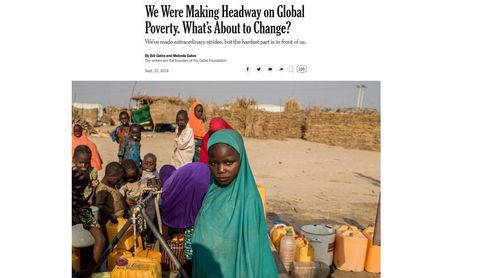
By Steve Sailer
09/25/2018
As I’ve long been pointing out, one of the most worrisome problems of this century is sub-Saharan African population growth. UN forecasts are staggering. The good news is that it’s likely not an insoluble problem, but only if the Great and the Good get to work on it soon.
My impression has long been that Bill Gates is, deep down, the Protestant guy appalled by Irish Catholic fecundity in Monty Python’s Meaning of Life. But even if you are Bill Gates, you have to be worried about coming out and saying: There are going to be way too many black people if we don’t do something fast.
Earlier this week, Gates came out of the closet about how worried he is about African population growth in an interview with the UK Telegraph. But now he’s written an op-ed for the NYT that treats the subject so gingerly that most of the commenters don’t seem to have much of a clue what’s Gates is driving at.
We Were Making Headway on Global Poverty. What’s About to Change?
We’ve made extraordinary strides, but the hardest part is in front of us.
By Bill Gates and Melinda Gates
The writers are the founders of the Gates Foundation.Sept. 22, 2018
Do you think the number of poor people in the world has gone up or down in the past 25 years?
This question is an excellent conversation starter because practically everybody answers it incorrectly. Primed by depressing and shocking headlines, most people assume that poverty has increased. Some people say it has held steady. Almost none are aware that in fact, more than a billion people have overcome poverty just since the turn of the millennium.
This huge drop in the number of people living on less than $1.90 per day is among the most underappreciated and most important developments of our generation.
But it’s not guaranteed to continue. In fact, progress against poverty is in jeopardy. According to current projections, the number of people in extreme poverty will stagnate at over 500 million. In the worst-case scenario, it could even start going back up.
Why has the world arrived at this crossroads? The answer is the unfortunate intersection of two demographic trends.
First, as extreme poverty disappears from many places, including China and India and, increasingly, many countries in Africa, it gets more and more concentrated in the most challenging places in the world. Poverty is especially stubborn in a group of about a dozen countries in sub-Saharan Africa marked by violent conflict, severe climate change, weak governance and broken health and education systems. More and more, extreme poverty will be a feature of life only where people’s opportunities to overcome it are brutally limited.
Second, these dozen countries are growing faster than every other place in the world. In the United States, women have an average of two children. In Niger, one of the poorest countries in the world, they have an average of seven. Births aren’t randomly distributed geographically. Rather, they are concentrated in the places where poverty is concentrated. Based on current trends, a growing proportion of babies will be born in places where adults have to devote most of their resources to survival, leaving very little to invest in their families, their communities and their countries.
This dual phenomenon of persistent poverty in fast-growing places explains why, by 2050, more than 40 percent of the extremely poor people on the planet are projected to live in just two countries: the Democratic Republic of Congo and Nigeria.
I think Gates is trying to fight the good fight here, but the intellectual climate is so hysterical these days that even if you have $80 billion or whatever Gates has, you have to tiptoe around reality.
This is a content archive of VDARE.com, which Letitia James forced off of the Internet using lawfare.